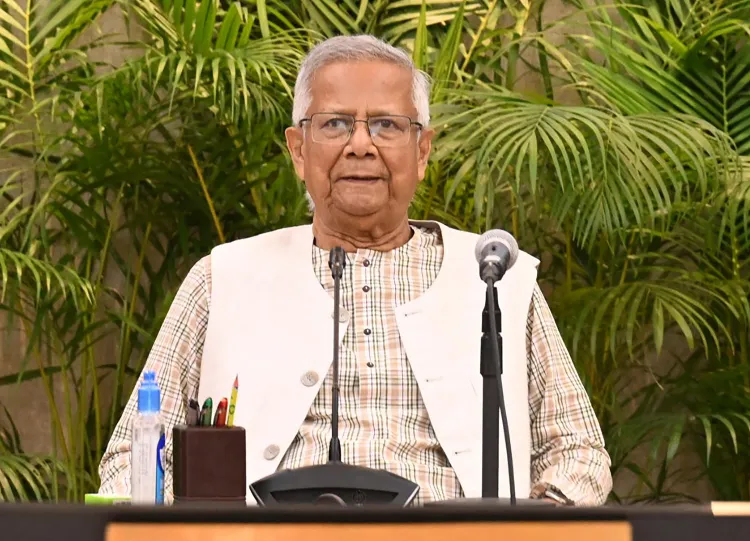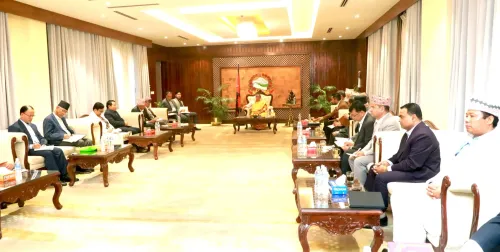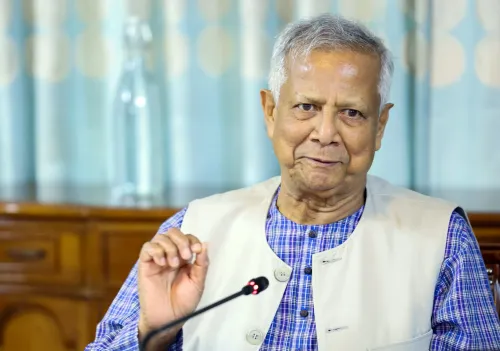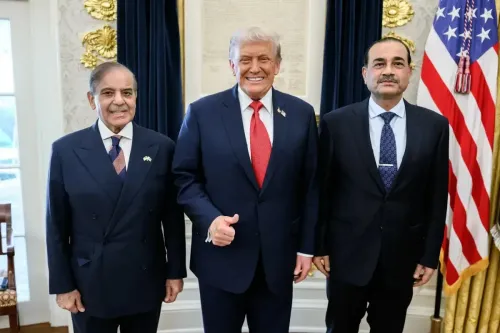What Did Bangladesh's Chief Advisor Muhammad Yunus Reveal in the 'July Declaration'?

Synopsis
Key Takeaways
- Muhammad Yunus announced the July Declaration on August 5.
- The declaration seeks to recognize the Student-Mass Uprising 2024.
- It aims to include the uprising in a revised constitution.
- Criticism arose as some students boycotted the event.
- The document reflects the aspirations of Bangladesh's youth.
Dhaka, Aug 5 (NationPress) The Chief Advisor of Bangladesh, Muhammad Yunus, revealed the July Declaration on Tuesday, declaring that the revised constitution will incorporate it as a scheduled annexure, signifying the uprising as a pivotal event in the democratic evolution of Bangladesh.
During the announcement, Yunus emphasized that the “Student-Mass Uprising 2024” will receive full state and constitutional endorsement under a revamped constitution, set to be adopted by the upcoming elected government. He made this announcement at a significant public gathering held at the South Plaza of the National Parliament, commemorating the first anniversary of the Awami League government's ousting, according to a report from Dhaka Tribune.
The event was attended by notable figures including BNP Secretary General Mirza Fakhrul Islam Alamgir, Jamaat-e-Islami’s Golam Parwar, Nationalist Citizen Party’s Nahid Islam, Ganosamhati Andolan’s Jonayed Saki, Nagorik Oikko’s Mahmudur Rahman Manna, and Gono Odhikar Parishad’s Nurul Haque Nur.
Yunus stated that the declaration document reflects the aspirations of the Bangladeshi populace. He noted that the citizens wish to protect the rights of both present and future generations through an environmentally sustainable, resilient, and inclusive development strategy, as reported by United News of Bangladesh.
While presenting the 28-point declaration, he affirmed, “Thus, the people of Bangladesh express their wish for the student-people uprising of 2024 to gain adequate state and constitutional acknowledgment, with the July Declaration included in the schedule of the reformed constitution framed by the government emerging from the subsequent national election.”
The July Declaration serves as a political manifesto commemorating the first anniversary of the Awami League government’s downfall. The anti-discrimination student movement initially proposed a declaration in December last year, which led to the interim government’s decision to release the July Declaration, as reported by Dhaka Tribune.
In a contrasting note, students who participated in the protests against former Prime Minister Hasina chose to boycott the event, expressing their sentiment that their “courage” has become “worthless” within a short span, as not all were invited.
Abdul Hannan Masud, the coordinator of Students Against Discrimination (SAD) and Senior Joint Chief Coordinator of the National Citizen Party (NCP), shared on social media that he would not attend the event.
He remarked, “It has come to my attention that this government failed to invite 158 coordinators and co-coordinators, the legitimate representatives of the July Uprising. Even if they set aside a few seats, it will not accommodate all 158 individuals.”
Masud added, “The contributions of those whose bravery and leadership enabled this coup have been rendered insignificant in less than a year. If my fellow activists who spearheaded the movement to dethrone Hasina are not honored, I, Abdul Hannan Masood, hereby declare my boycott of tomorrow’s July Declaration program.”
The Students' Federation General Secretary Saikat Arif also announced their decision to abstain from the event.









